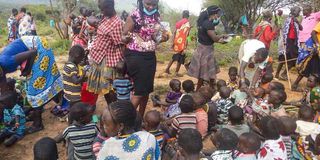Speed up FGM, early marriage cases, courts told

Ms Teresa Cheptoo, the World Vision project officer for the Girl Child Promotion Project, helps children in West Pokot. She has urged the Judiciary to fast-track FGM and early and forced marriage cases to deter the crimes.
What you need to know:
- Ms Teresa Cheptoo, the World Vision project officer for the Girl Child Promotion Project in the county, said the cases take long to resolve.
- Ms Cheptoo said most FGM cases happen in remote areas and residents find it difficult to seek legal redress in Kapenguria town because of the long distance.
The Judiciary has been challenged to fast-track the prosecution of Female Genital Mutilation (FGM) and early and forced marriage cases in West Pokot County.
The vices are blamed for a high school dropout rate. Ms Teresa Cheptoo, the World Vision project officer for the Girl Child Promotion Project in the county, said the cases take long to resolve.
Speaking in the Alale area during a sensitisation meeting, Ms Cheptoo said most FGM cases happen in remote areas and residents find it difficult to seek legal redress in Kapenguria town because of the long distance.
“The Judiciary process is too long and tedious, expensive and most people get tired on the way, hence leading to termination of the cases,” she said.
Consequently, she asked the courts to set up mobile courts in remote areas to enable women and girls, whose rights have been violated, to seek justice.
Kapenguria Senior Resident Magistrate Ndubi Okwengu said many cases are settled in village barazas instead of the courts. He said the local communities need a lot of sensitisation and legal aid.
“People in areas like Alale, Sigor and Kainuk don’t know the court process and they have no capacity and knowledge to do so. That is why they rely on repugnant culture to settle disputes of capital nature, which are repugnant to justice and morality. They need legal aid and need to know what is supposed to be done during trial so that they represent themselves better,” he said.
Leaders put on the spot
Ms Cheptoo also accused elected leaders from the county of sabotaging the fight against the retrogressive practices, saying they have been encouraging the vice for their own selfish interests, mainly to protect their votes.
“Some leaders bail out perpetrators and parents who are arrested for forcing their daughters to undergo the vice. This shows the community is not ready to fight the vice as there is no joint effort,” she said, urging the government to sensitise them to the anti-FGM law.
She called on men from the local community to be at the forefront of the fight against the vices. “Men should start marrying uncircumcised girls for us to win this war.”
Irep Foundation Director Domtillah Chesang suggested that men sign an agreement committing to the campaigns. She asked the government to punish offenders to enable girls to access quality education.





